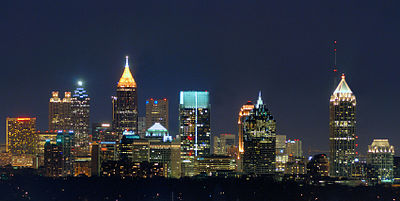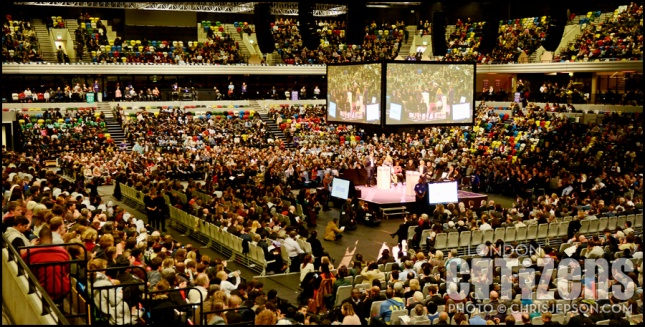
The Copper Box sits at the far end of Stratford’s Olympic Park. It was used during the 2012 Olympics to host lively games of handball and fencing. The venue was much praised for its fantastic acoustic as supporters’ cheered for their preferred team. Last week the Copper Box was transformed for one night into the setting for a rather different kind of sport: the London mayoral assembly organised by London Citizens/Citizens UK. 6,000 Londoners from every corner of the city gathered for a rather unconventional event. Unlike your average election hustings there were no questions from the audience or hands in the air, no lengthy speeches by politicians or opportunity for the candidates to get stuck into each other. Part carnival, part theatre, part liturgy, part town hall meeting; a community organising assembly is a difficult beast to describe to those who have not experienced its unique drama.
Attendees at last Thursday’s assembly represented ‘chapters’ of the biggest broad-based community alliance of civil society organisations and institutions in London: 2,000 from East London, 2,000 from West London and the remainder from chapters in North and South London. The membership of London Citizens consists of mosques, synagogues, churches, trade unions, schools, universities, and traders associations. Faith organisations make up the core of London Citizens (and the national grouping Citizens UK, which takes in groups in Leeds, Birmingham, Wales and most recent in gestation Tyne and Wear here in the North East), but this is not – in formal terms – a faith-based initiative. It is a deliberately mixed group of faith groups and other civil society organisations, bringing together people who are committed to working together in local areas on an agenda agreed through a democratic and relational process of negotiation.
What do I mean by a relational process? The core of organising works on the basis of one-to-one meetings carried out across member organisations. These meetings help identify the passions and interests of members and the things they most want to change about their common life. These one-to-ones also provide the basis for discovering hidden leadership talent – people who want to take a lead in speaking up and acting with and for themselves others in public life. From these meetings come a mosaic of concerns and interests that feed into the development of a democratic (voted on) agenda for action.
To make this concrete: the now famous Living Wage campaign built on the stories heard by faith communities amongst their members about the impact of low pay. The campaign for community land trusts as a response to a lack of social and affordable housing, protected for the next generation as well as this, came from stories about the impact of the rise in the cost of housing in London. The multiple campaigns to provide a path to regularise the status of undocumented migrants already living here, to end the detention of children for immigration purposes and to improve the processes for those claiming asylum came largely from stories told first often to pastors, priests, head teachers and faith leaders. Organising provided a vehicle to turn those concerns into forms of political action.
On Thursday evening last week the organisers of the assembly were working with the organising conviction that citizens have intensified forms of power in the lead up to elections, and that the critical move is to use that power – by organising people to act for their interests and the common good – in order to establish a relationship with whoever wins: an agreement to work together on the issues raised. Organising works on the basis of securing a relationship through negotiation. But securing a way to negotiate with political power is never as simple as just turning up and asking. Hence the drama, the liturgy and the town hall style engagement. The rules are: no heckling, no booing. Polite but firm engagement on a democratic agenda.
The assembly began with a carnival atmosphere as representatives from the strong and diverse Latin American community working in London paraded onto the stage with flags representing their communities and dancers who entertained the gathering with extraordinary performances. The crowd warmed up and the tone set – this is OUR assembly, and this is a form of public, political space in which traditions ground what we do and say – Zac Goldsmith and Sadiq Khan took their places on stage.
The evening revolved around negotiations on an agenda agreed by the 6,000 present through lengthy months of planning: job and apprenticeship opportunities for young Londoners. A Living Wage commitment: would each candidate commit to paying a Living Wage not just to staff but insist that all procurement with city government in London was done with a guarantee of a Living Wage? A commitment on 50% new build affordable housing, and the introduction of the idea of a London Living Rent to be set according to the Tawney / Beveridge standards that no more than 1/3 of wages should be necessary to access decent housing. On immigration, a commitment to taking more than the paltry 40 Syrian families to have been settled in London so far under the government’s most recent scheme.
But a list like this gives little sense of the drama – and even at times tongue in cheek humour – of the proceedings. Each of these items for negotiation was presented by a civil society leader whose aim was to present an ‘ask’ and demand a no wriggle room public commitment. Each ‘ask’ involved the powerful delivery of testimony – truth to power – by a Londoner affected by each of the issues. Two of the most moving moments of the evening were when a young Nigerian woman addressed Khan and Goldsmith: she 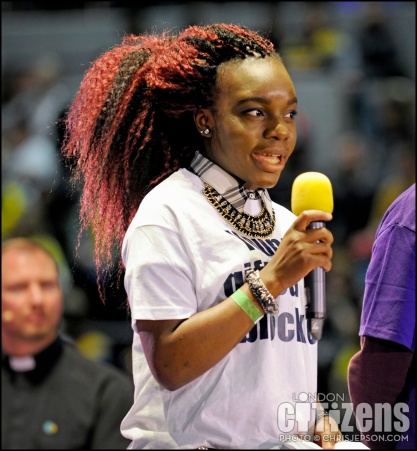 explained that she had lived in London since the age of 2, but she had recently been taken in a dawn raid by immigration officials and detained for six weeks before being released again. She spoke of fear, of exclusion, of her inability to get a student loan or a proper bank account, of her ten year wait to become a citizen in the only country she has ever known: ‘I am a Londoner’. The stadium came to its feet to recognise her contribution. She was followed by a young Syrian photographer, 28 years old, who fighting back emotion told of his journey through Europe to London. He too was met with an emotional ovation. Each made their ask to Khan and Goldsmith.
explained that she had lived in London since the age of 2, but she had recently been taken in a dawn raid by immigration officials and detained for six weeks before being released again. She spoke of fear, of exclusion, of her inability to get a student loan or a proper bank account, of her ten year wait to become a citizen in the only country she has ever known: ‘I am a Londoner’. The stadium came to its feet to recognise her contribution. She was followed by a young Syrian photographer, 28 years old, who fighting back emotion told of his journey through Europe to London. He too was met with an emotional ovation. Each made their ask to Khan and Goldsmith.
On housing a single mother of three, a key worker, spoke of her shame at not being able to afford enough bedroom space for her children, of her sense of failure the day that her teenage daughter needed to be given a mattress on the floor of the lounge as her permanent bedroom, of the son who still shares her room. A 15 year old schoolboy spoke powerfully of the displacement of his own working class family from their roots in one area of London as prices rose and the five house moves that have marked his school years. And then there was the clever idea to stage a ‘march of the keyworkers’. To the singing of Madness’ ‘Our House’ representative teachers, uniformed nurses, fire fighters, and police marched around the stage area in front of Khan and Goldsmith to make the point that those who keep London moving often cannot afford to live in the city they serve. It was clever and powerful with more than a hint of humour.
It is probably clear from what I have written that this style of politics attempts to recognise personhood – it doesn’t celebrate narrow issues or ossified identities, but it seeks to humanise political processes and recognise the deep motivations people bring to politics. By default it also happens to humanise the politicians too. Both Goldsmith and Khan were able to talk about their own roots and motivations, to be honest about what they could not promise – where consensus could and, equally importantly, could not be built.
Opened by the Bishop of London, closed with simultaneous Jewish and Muslim prayers – poignant in a week marked by brittle debate about racism, anti-semitism and politics – this was a remarkable gathering which defies the usual categories we use to think about religious and political action. The candidates were pushed hard – although there were times they could have been pushed harder – and made public commitments to which the winner will be held to account. But more significantly Khan and Goldsmith experienced the energy and vitality of a group of 6,000 Londoners who understand the power they have to bring change and to insist that politics matters.
Two concluding observations.
The coverage of the event in the media was a fairly disappointing affair. The reporting that did take place was skewed to reporting the ways in which an already favoured candidate had done better than the other obviously hopeless candidate. The Guardian reported how at home Sadiq Khan was amongst a throng of faith groups. It did not say that both candidates in fact where appealing to their base faith constituencies: Jewish and Muslim. It did not say that whilst the crowd did seem to favour Khan, at times Goldsmith was willing to make stronger public commitments. He grasped the procurement issue on the Living Wage more convincingly, although he gave less on housing and migration. Khan looked less comfortable as things wore on until delivering his powerful speech on housing at the end, Goldsmith often looked more relaxed. Nor did the media coverage show much interest in the profoundly unusual form of politics on display. A tough crowd to please, a higher energy event seemed to be the line. But no greater curiosity was shown – for good or bad – about what was on display.
My final observation is that of a non-Londoner watching a profoundly London form of politics unfold. Two things struck me (and my politician companion sitting by my side): there is still great energy for politics in London – a Northern crowd would have been harder to please, less easy to placate. This isn’t romanticism for the tough, gritty North, but awareness that I think Londoners still feel power pulse through their veins in a way that the North often does not. Finally, there was a palpable sense on Thursday that London has made peace with itself as a city marked by migration. The unequivocal support that brought the roof down for the young Nigerian woman without status and the Syrian photographer was deeply moving to see, but I wonder whether a cross section of any other city would show such an overwhelming sense of embrace and recognition? Whether the ease of interaction amongst the immensely diverse range of school pupils as they presented their common concerns on housing and jobs would be quite the same elsewhere? There was a glimpse of the soul of a city on Thursday, and it was something to behold.
Anna Rowlands is Lecturer in Catholic Studies whose research focuses on political theology. Photos by Chris Jepson.

![]()
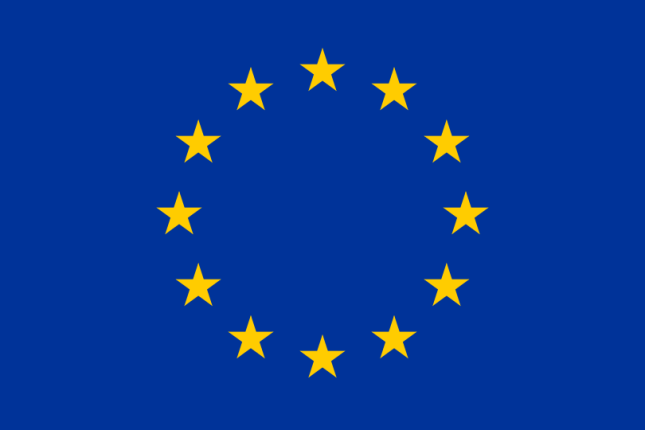 The failure of the European Union as a whole to address the refugee crisis with any coherent vision of human dignity is a matter of deep shame, which Pope Francis has recently highlighted in one of his powerful gestures. Some very ugly political forces are crawling out from under stones. The Euro has become a nightmare, in which democracy has been subjugated to the interests of French and German banks, the taxpayer made liable for their reckless lending, and no account at all taken of the interests of the poor. UK politicans take turns in giving thanks that we have opted out of both Schengen and the Euro. Yet are not a common currency and a common border the hallmarks of a unified Europe? Is that project, that ever-closer union, now dead?
The failure of the European Union as a whole to address the refugee crisis with any coherent vision of human dignity is a matter of deep shame, which Pope Francis has recently highlighted in one of his powerful gestures. Some very ugly political forces are crawling out from under stones. The Euro has become a nightmare, in which democracy has been subjugated to the interests of French and German banks, the taxpayer made liable for their reckless lending, and no account at all taken of the interests of the poor. UK politicans take turns in giving thanks that we have opted out of both Schengen and the Euro. Yet are not a common currency and a common border the hallmarks of a unified Europe? Is that project, that ever-closer union, now dead?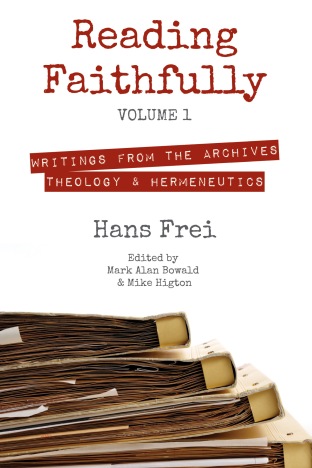 It is all too easy to think that other people find it easier to write, and to get published, than you do. They journey from initial thoughts to first drafts to finished product seems to run smoothly for them, without any of the stops and starts, the confusions, the reversals and dead ends that you experience yourself. And even when they do complain of the difficulties and delays, a shiny new publication often seems to pop into existence shortly thereafter, making it hard to believe that their experience is really the same as yours. The real labour, and real difficulty, of other people’s writing is mostly hidden from us.
It is all too easy to think that other people find it easier to write, and to get published, than you do. They journey from initial thoughts to first drafts to finished product seems to run smoothly for them, without any of the stops and starts, the confusions, the reversals and dead ends that you experience yourself. And even when they do complain of the difficulties and delays, a shiny new publication often seems to pop into existence shortly thereafter, making it hard to believe that their experience is really the same as yours. The real labour, and real difficulty, of other people’s writing is mostly hidden from us.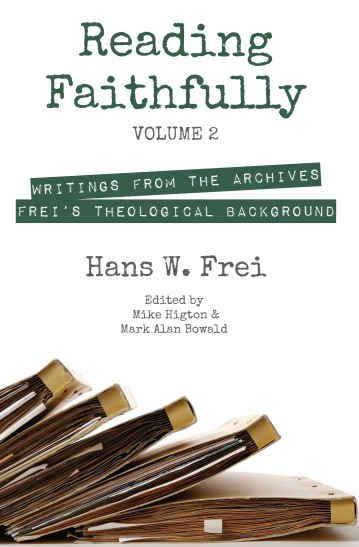

 explained that she had lived in London since the age of 2, but she had recently been taken in a dawn raid by immigration officials and detained for six weeks before being released again. She spoke of fear, of exclusion, of her inability to get a student loan or a proper bank account, of her ten year wait to become a citizen in the only country she has ever known: ‘I am a Londoner’. The stadium came to its feet to recognise her contribution. She was followed by a young Syrian photographer, 28 years old, who fighting back emotion told of his journey through Europe to London. He too was met with an emotional ovation. Each made their ask to Khan and Goldsmith.
explained that she had lived in London since the age of 2, but she had recently been taken in a dawn raid by immigration officials and detained for six weeks before being released again. She spoke of fear, of exclusion, of her inability to get a student loan or a proper bank account, of her ten year wait to become a citizen in the only country she has ever known: ‘I am a Londoner’. The stadium came to its feet to recognise her contribution. She was followed by a young Syrian photographer, 28 years old, who fighting back emotion told of his journey through Europe to London. He too was met with an emotional ovation. Each made their ask to Khan and Goldsmith. “Amartya Sen is the person I most admire in post-war social science”, said Professor Stuart Corbridge, Durham’s new Vice-Chancellor. Evidently relishing the opportunity to escape the burdens of office and speak freely as a scholar, the VC was delivering part of a tag-team lecture together with myself and Dr Augusto Zampini-Davies, a theological advisor to CAFOD, and Dr Séverine Deneulin, a specialist on international development at the University of Bath. Our theme was “The Idea of Freedom: reading Amartya Sen from a Catholic perspective” and the four contributions fitted together rather well.
“Amartya Sen is the person I most admire in post-war social science”, said Professor Stuart Corbridge, Durham’s new Vice-Chancellor. Evidently relishing the opportunity to escape the burdens of office and speak freely as a scholar, the VC was delivering part of a tag-team lecture together with myself and Dr Augusto Zampini-Davies, a theological advisor to CAFOD, and Dr Séverine Deneulin, a specialist on international development at the University of Bath. Our theme was “The Idea of Freedom: reading Amartya Sen from a Catholic perspective” and the four contributions fitted together rather well.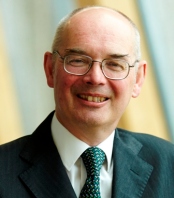
 our own
our own 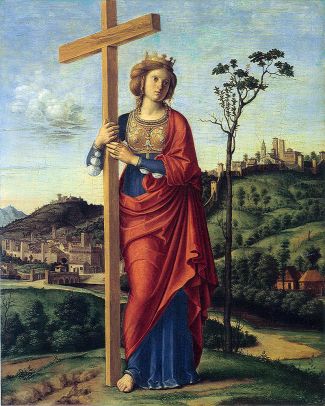 Religious Studies,’ conducted by members of Durham’s department of Theology and Religion (Mathew Guest, Sonya Sharma and Robert Song), drew particular attention to such issues and has become an important resource for subsequent discussions.
Religious Studies,’ conducted by members of Durham’s department of Theology and Religion (Mathew Guest, Sonya Sharma and Robert Song), drew particular attention to such issues and has become an important resource for subsequent discussions. very happy to announce the publication of Dr T.J. Lang’s new book,
very happy to announce the publication of Dr T.J. Lang’s new book, 